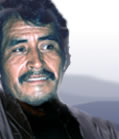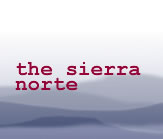 |
 |
||
 |
|||
|
GLOSSARY Mexico glossary |
transcriptThe translation of this interview consists of extracts only. |
| Section 1 | Which ones did you have? First the Liga Feminil (Womenís League) and after that I worked in the DIF (Desarrollo Integral de la Familia, Integral Development of the Family) with SeŮora Susana. After that I worked with the milk, here with SeŮora Refugia, I just had three cargos... |
...Now one of your sons, well, two or three of your sons have done a lot for the village, being in Mexico City. What do you think about all the fighting that the village has done to look after its land, its territory, the water, the resources that there are up there. The village has been fighting and you have lived through it, what do you think about all the fighting for the conservation of what we have up there? Well, what theyíre doing is good, isnít it? Looking after it, right? We look after it because it belonged to our grandfathers, right? Because now you can see that they exploit the forest brutally. We donít because it belonged to our grandfathers, right? They left it for the grandchildren and for their children afterwards, didnít they? Yes. But who knows what these people [from Lachatao, AmatlŠn and others] think, thatís why they still enter [YavesŪaís land] and exploit it there, thatís what uncle Chilco said... |
|
.ÖDo you have any nice memories of when you were young, here in this village? Anything you remember with a lot of happiness, something you participated in, your work, something that you remember well, something nice that has happened to you? Yes, happy, we were happy when we had a job, and finishing a cargo, finishing, yes. One gets used to a cargo and then when you leave, you always feel sad. In the cargos that weíve had, weíve helped the village. Iím grateful to the village for giving us those jobs. |
|
| Section 2 | ....for example, when you are alone, living alone all the time here, what do you do all day; you get up early, at five or six in the morning, and then what do you do? Well I do my work, what there is to be done here. I do what I can and what I canít, I donít. |
Do you go to the [corn] mill? Yes I go to the mill, I have breakfast and do what else there is to do, I leave my [corn] dough. In the afternoon Iíve already made the dough and Iíve got my tortillas (maize-based flat bread) already. I see to the animals and then I go to get firewood and twigs, after that I take a look at my land, I go to have a quick look, and see if my wall has fallen down, and thatís it. Sometimes I collect some stones and fix the wall a bit. I donít do it much now. I get a labourer to do it - clearing, I just do a little, like this, I donít do so much now. |
|
A moment ago you told me that years ago life was hard. How do you see things now with...? Well, itís not so hard anymore. |
|
Not anymore? Not so much. |
|
Itís not hard anymore. Itís not hard anymore, not anymore. |
|
You donít walk to sell things anymore. Not anymore. Before we went to Tlacolula over there, and then we went to Talea, Zoogocho, for the lime [stone]. Yes, we used to go carrying the lime but not anymore, itís sold right here now, and itís expensive now. One arroba (12 kilos) is 15 pesos now, 12 pesos the arroba... |